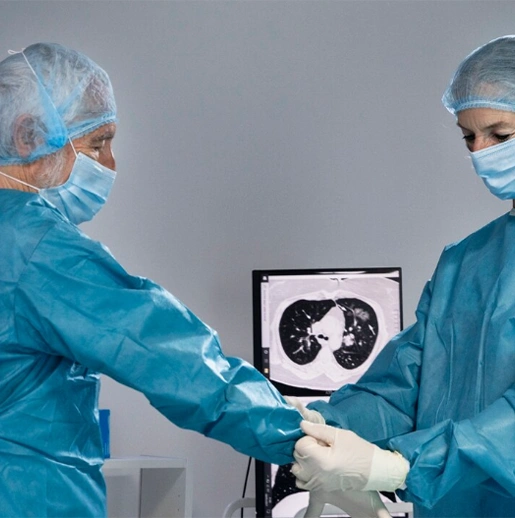What is liver transplantation? Liver transplantation is a procedure performed when the liver has significantly lost its functionality, involving the replacement of the damaged organ with a healthy liver from a donor. This treatment is effectively utilized for life-threatening conditions such as liver failure, cirrhosis, or liver cancer. While transplantation is usually carried out with livers from deceased donors, in some cases, a portion of the liver from a living donor may also be used.
What is liver transplantation, and How Does the Postoperative Process Progress? The postoperative period is crucial for patients to regain their health. Individuals who undergo liver transplantation must use immunosuppressive medications and attend regular medical check-ups. Adopting a healthy lifestyle and avoiding alcohol and harmful substances are also vital. Since the liver is responsible for detoxifying the body and maintaining metabolic balance, post-transplant care should prioritize protecting the new organ.
How is Liver Transplantation Performed?
Liver transplantation is a treatment method employed when the liver has completely lost its functionality or suffered severe damage. Liver failure, the most common reason for this procedure, can develop acutely or chronically. Liver failure may result from alcohol dependency, viral infections such as hepatitis B and C, drug toxicity, or certain genetic disorders. When the liver becomes nonfunctional, transplantation is necessary to save the patient’s life.
The preoperative phase involves a critical step of finding a suitable donor. While livers are typically obtained from deceased donors, transplantation can also be performed using liver tissue from living donors.
The recipient undergoes a comprehensive medical evaluation to assess their overall health and identify any risks that may arise during the surgery. The operation, conducted under general anesthesia, typically lasts 6 to 12 hours. During the procedure, the damaged liver is removed and replaced with a healthy donor liver. Post-surgery, the patient requires close monitoring in an intensive care unit.

Among the conditions necessitating liver transplantation, liver cirrhosis holds a significant place. Cirrhosis is a chronic condition where the liver’s normal structure is replaced with fibrotic tissue. This disease often develops due to long-term alcohol consumption or viral infections. Additionally, liver steatosis (fatty liver) can progress to serious conditions requiring transplantation. Fatty liver, often associated with metabolic disorders such as obesity and diabetes, may lead to complications like cirrhosis or liver failure when advanced.

What are the Risks for Liver Donors?
Liver transplantation is a life-saving procedure for both recipients and donors. However, it involves certain risks, especially for donors. As donors are generally healthy individuals, the primary objective of the medical team is to ensure their safety at the highest level. Modern medical technologies have focused on minimizing these risks. Innovative techniques such as robotic surgery have facilitated less invasive donor surgeries.
Traditional liver surgery involves extensive surgical procedures, which may result in prolonged recovery periods. However, minimally invasive techniques reduce hospital stays and lower the risk of postoperative complications. Despite these advancements, risks such as bleeding, infection, or anesthesia-related complications remain inherent in any surgical procedure.
Robotic liver surgery, which has advanced in recent years, enhances the safety of donor experiences. Robotic systems allow surgeons to perform precise incisions and complete operations without damaging surrounding tissues. This approach aids donors in recovering faster and returning to their normal lives sooner.
The primary risk for donors lies in the recovery process of the liver portion removed. In rare cases, liver failure may develop in donors. However, medical teams meticulously evaluate donors to minimize this risk.
What is Life Like After Liver Transplantation?
Organ transplantation significantly enhances the quality of life for many patients. Post-liver transplantation, patients can lead healthier and more active lives than before. However, the success of this process requires close collaboration between the patient and the healthcare team.
The first few months after transplantation are critical for recovery. Patients undergo regular check-ups, and tests are conducted to ensure their bodies accept the new liver. To prevent organ rejection, lifelong use of immunosuppressive drugs is necessary. The dosage and type of these medications are monitored through regular blood tests and adjusted as needed.
During the postoperative period, adopting a healthy lifestyle is crucial. A balanced diet, regular exercise, and avoiding harmful substances such as alcohol help maintain long-term liver health. Additionally, adhering to hygiene protocols is essential to minimize the risk of infections.
Many liver transplant recipients can return to normal life within a few months post-surgery. Resuming work, participating in social activities, and engaging in physical activities are possible. However, every individual’s recovery process is unique, and any issues during this period should be promptly addressed with the healthcare team.
Can Cirrhosis be Cured with Liver Transplantation?
Cirrhosis is a severe condition resulting from permanent liver damage and loss of functionality. It is often associated with factors such as alcohol consumption, hepatitis infections, or fatty liver disease. In cirrhosis, the liver’s regenerative capacity diminishes, leading to irreversible tissue damage.
Is liver transplantation an effective solution for treating cirrhosis?
Liver transplantation is commonly used for advanced cirrhosis cases. This procedure involves replacing the diseased liver, which has completely lost its functionality, with a healthy donor liver. Transplantation significantly improves survival rates, especially when complications progress, and other treatments prove ineffective.
However, liver transplantation may not be suitable for every cirrhosis patient. Suitability depends on factors such as the patient’s overall health, the functionality of other organs, and the underlying cause of cirrhosis. For instance, patients with alcohol-induced cirrhosis must abstain from alcohol for an extended period to be considered for transplantation.

Post-transplantation, patients are relieved of symptoms caused by cirrhosis and experience significant improvements in quality of life. However, the successful long-term outcome of the transplantation requires strict adherence to immunosuppressive drug regimens and the adoption of a healthy lifestyle.
Liver transplantation offers an effective treatment option for cirrhosis, providing patients with a new lease on life. However, this process demands thorough evaluation and long-term commitment.











